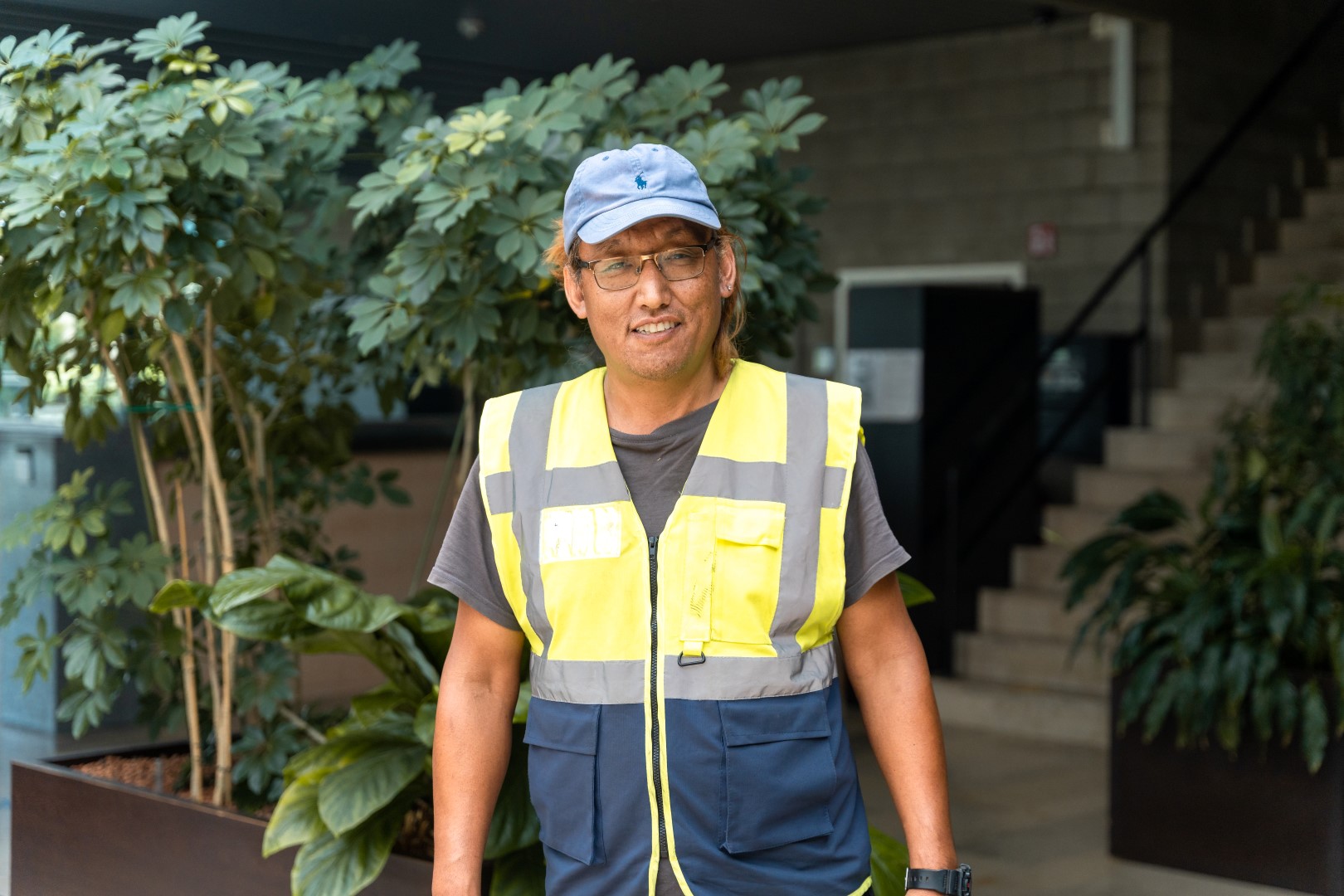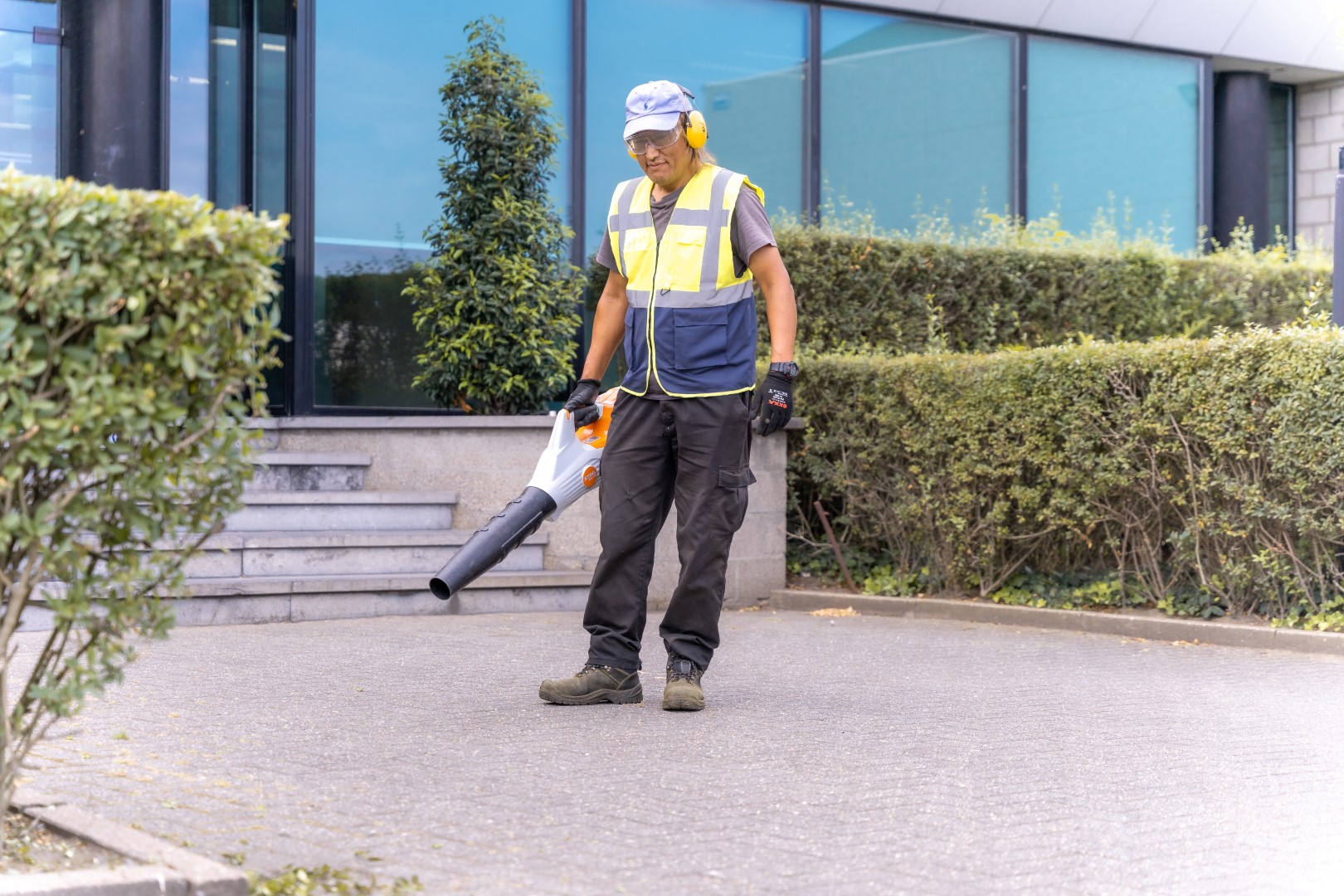Refugees and work, it is a hot topic given the influx of migrants in recent years. Dorjee proves that it doesn’t have to be a topic. After fleeing Tibet and an unlikely journey, he has worked his way up to brigadier in green maintenance at Green Masters.
In 1996, Dorjee left everything behind and fled Tibet. The journey he has taken since then captures all imagination. It eventually brought him to Green Masters, where he was able to work in green maintenance. Thanks to his positive attitude and perseverance, Dorjee progressed to brigadier.
Left Tibet as refugees
Tell me Dorjee, how did you end up in Belgium?
In 1996, I fled Tibet towards Nepal, after which we moved on towards India. In India, I lived in a monastery as a monk for ten years. Many Tibetans left with me. That happened when the Chinese authorities came to Tibet. They said they would give us an education, but actually they came to gather information about the Dalai Lama. All the bad things we knew about the Dalai Lama, we had to tell them.
“We had to step for a month, the last few days we even ran out of food.”
So you didn’t do that…
No, as monks, we had no bad things to say about the Dalai Lama either. The Chinese authorities gave us all kinds of papers that we had to sign. These were false declarations. If we signed them, we were allowed to stay. But I didn’t sign and then left. Using an escape route, I eventually ended up in India via Nepal.
No contact with his family
How long did you spend on the road?
We had to walk for a month. And then we were lucky that it wasn’t snowing, because with snow on the mountains in Nepal, there are chances that you won’t survive. The last few days were really tough though, because we ran out of food. But we did reach India after all.
Is the situation in Tibet any better in the meantime?
No, it is still not good. I don’t dare to call my family yet. Maybe the police are listening in and would ask questions about my family. I don’t want them to get into trouble because of that. I hope there will be more democracy in the future.
Arrived in Belgium as refugees without work
Eventually you ended up in Belgium as refugees, without work or family.
Yes, I stayed in India for 10 years and then I left for Belgium in 2006. When I arrived here, I had several jobs. I worked in a flower nursery for a while and also picked tomatoes. Eventually, I ended up at a company where I could work in the green service. There I learned a lot.
Afterwards, I also did green maintenance through the social enterprise Levanto. They had a good contact with Green Masters and that’s how we found out that Green Masters needed two men for the green service. We were told in advance that if we did a good job, a permanent contract was possible at Green Masters. And that’s what I ended up getting!
Dutch as the working language
Did you find your way at Green Masters right away?
Yes, from the day I started here, there was a strong commitment to learn Dutch. That has only improved since then. Not only through training, but also by speaking it daily. At work, we always communicate in Dutch. Among ourselves, we may sometimes speak our own languages, but the main language during work is Dutch.
I have also had a lot of other training here, as the only ‘education’ I received in Tibet was Buddhism. Here, through Eduplus, we are retrained every winter. Around November, training on, for instance, the use of machinery and safety begins. This is how we work towards the high season every time.
Other former refugees at work at Green Masters
Besides you, there are other Tibetan refugees at work at Green Masters.
No, there are even a number of Tibetans working here at Green Masters who have also been in the monastery with me. They, and the other colleagues, are really super important to me. Family and children are also important, of course, but with your colleagues, you spend 5 days a week together. Then you have to respect and help each other.
“Both privately and professionally, I have settled very well.”
Currently, you have progressed to brigadier?
That’s right. First I had the chance to advance to team leader. Then I managed one team and had a fixed list of what needed to be finished every month. Currently, I am a brigadier and have a complete overview. I go from team to team and check the work. I correct where necessary and train people. If I am on site and see that something has not been done properly, I will also point it out.
Safety, speed and quality
How do you handle that responsibility?
I think it is important that everyone who works here takes responsibility. We all earn our income here, so we also have to deliver quality. That way, we can also continue to grow. If the customer is happy, we are happy too. The three most important things I want to pay attention to are safety, speed and quality. Sometimes elsewhere you see workers with six or seven people standing still together with a rig in their hands. You can’t do that at Green Masters.
How do you try to manage your crews?
I think it’s important to listen carefully. If someone wants to say something or is facing a problem, I try to understand as much as possible. If you don’t, there is often more stress involved. I never raise my voice and always try to solve everything quietly. We all have to give our best to help everyone.
Formerly one of many refugees, now a family man with steady work
How has your life changed in the meantime? First you were on the road with other refugees, now you have a famil and steady work. How do you look back at your journey?
My life changed very much from the moment I left Tibet. There, we had no cars, no electricity, … Over the years, I learned more and more about the world. I saw a real city for the first time when I left Tibet.
“Everybody respects Dorjee”
Green Masters is more than happy with Dorjee. “He manages the team but is extremely calm. Everyone respects him and listens when he says something. They all look up to him; that positive energy makes it so much fun to work with him.”
“Everyone looks up to Dorjee, he never has to raise his voice.”
“He conveys that calmness not only to his colleagues, but to all of us. When we have internal meetings, he is always there too. If our green masters have comments, or ideas to improve the work, Dorjee informs us. The masters sit on the sites every day and see what is happening. This effectively gets through to the planning and to the manager, we then listen and really take this into account. Dorjee is the ideal middleman.”
In Nepal and India, I encountered new situations again and eventually here in Belgium. But growing up in Tibet means I could live very simply even now, even without electricity.
I currently live here in Merksem and have a wife and two children. I am also very happy with my work at Green Masters. So both privately and professionally, I have settled very well.



